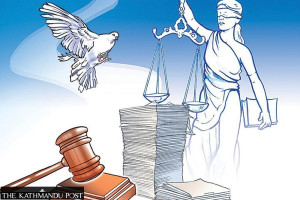Opinion
Removing the bottlenecks
The undeclared economic blockade has brought Nepal-India ties to their lowest ebb
Niranjan Mani Dixit
A founding member of the South Asian Association for Regional Cooperation (Saarc) and an active member of the United Nations, Nepal has finally promulgated its new Constitution after seven years of strenuous exercise by the elected Constituent Assembly (CA) and its constitutional committees, marking the successful conclusion of the peace process after the ‘People’s War’ led by the Maoists. The new Constitution was endorsed by more than 90 percent of the CA and welcomed by many countries including China, the USA, the UK, Japan, South Korea, Bangladesh, Sri Lanka and Pakistan, except India. Likewise, the UN termed it a ‘milestone’. Misconceptions among the people about the statute, if any, are being debunked by the state.
Result of the blockade
Nepal’s bilateral relations with India, unlike with China, have been growing wobbly as evidenced by the pending bilateral issues, and currently the unannounced trade and transit blockade that has been maliciously imposed for more than two and a half months at all the five border checkpoints. The southern neighbour has mounted the blockade as a ‘political weapon’ for no justifiable and valid reason in violation of international laws, the UN Charter on trade and transit privileges as fundamental and permanent rights of a landlocked country, World Trade Organisation regulations and Saarc and bilateral protocols. It also goes against the contract between Indian Oil Corporation and Nepal Oil Corporation for an uninterrupted supply of petroleum products.
As a result, almost 30 million Nepalis including those living in the Tarai are leading fettered and awful lives, wanting vital supplies such as cooking gas, petrol, diesel, aviation fuel, food and medicine including blood bags and oxygen to survive and progress. Similarly, at least seven million children have been deprived of education. Nepal has already lost an estimated Rs 2,500 billion in national revenue, industrial and agricultural production and tourism receipts. More than 2,000 factories have been shut down. Among numerous infrastructure projects, the construction of ongoing hydropower projects, Melamchi drinking water project and post-earthquake reconstruction of 24,000 schools and government buildings and homes for 1.2 million homeless families have been hindered, making government and international donors unable to spend the allocated budget. Over 2 million workers are jobless and project time and cost overruns are escalating. Hence, Nepal is viciously becoming economically and socially withered and crippled.
Indian intervention
Several studies have reported that there has been a threat to Nepal’s sovereignty, territorial integrity and development due to border encroachments by India at 54 places, and the presence of Indian troops at Kalapani-Limpiyadhura since the 1962 Sino-Indian War; at Lipu-Lekh Pass, an ancient route for traders and pilgrims transiting between Nepal and Tibet, since the signing of a pact with China during Indian Prime Minister Narendra Modi’s visit on May 15; at Susta, a Mechi riverian sector, since 1995; and at Sandakpur Hill in Ilam, a tourist spot. Of the 8,553 border pillars marking the approximately 1,400-km-long border with India, 1,325 are missing and many have been demolished.
Likewise, the unilateral construction of river dams by India at many places, including Tanakpur Barrage, Rasiawal Khurdalotan in Marchawar and Laxmanpur, and a 22-km embankment on the River Rapti cause flooding of Nepal’s fertile lowland and human settlements in the Tarai in the monsoon. The Indo-Nepal Peace and Friendship Treaty of 1950, which was signed by the then undemocratic and autocratic rulers of Nepal, has become obsolete and overdue for a review or cancellation. Nepal’s 1975 proposal to be declared a Zone of Peace was endorsed by 115 countries including China, but India amazingly refused to do so. The decades-old passport or controlled border system, which was relaxed after the tactical construction by India of a twisting and dangerous Tribhuvan Highway linking Kathmandu with the Indian border in the mid-1950s, has not been reinstated.
Political analysts, intellectuals, non-resident Nepalis and civil society members suspect that the Tarai-based political parties protesting against the new Constitution from no-man’s-land on the Nepal-India border are being implicitly mollycoddled and supported by India to the extent of allowing its territory and facilities to be used as in Raxaul and Rupaidiya. India recently organised a discussion with them in New Delhi, prolonging the blockade to create political pressure on Nepal to meet their demands which include changing the boundaries of the federal states in violation of the Constitution and the rights of people living in other states.
A way out
The Indian government should instead focus on its domestic problems with ‘rishi man’ to eliminate political conflict, intolerance and poverty. The international community, and even a number of leaders of the Bharatiya Janata Party and opposition parties, have found the Modi government’s non-cooperation and illegal attitude against the sovereign Federal Democratic Republic of Nepal to be illogical, unethical, inhuman and outrageous. However, Nepal has never intervened in India’s internal affairs like the Gorkhaland Movement and the Gorkha (Nepali) Regiments in the Indian Army and border issues with other neighbours.
To find a way out, the Indian government should refrain from blockading Nepal and dictating to it on constitutional matters. Modi’s visit to Nepal in August 2014, and his sincere gesture of munificence and assurance to start resolving all the pending bilateral issues with action plans should be carried out. Nepal’s coalition government should hold sincere negotiations with Madhesi leaders by involving the opposition Nepali Congress. The provisions in the Constitution should be respected, and all sides should give up rigidity to end the impasse and allow the country to leap forward in national development, but they should safeguard the age-old harmony among the Nepali people, national sovereignty, territorial integrity and dignity. The government should also appeal to the United Nations to keep the border checkpoints under surveillance until the unannounced blockade is removed.
Dixit is a Grants Business and Development professional




 14.12°C Kathmandu
14.12°C Kathmandu










